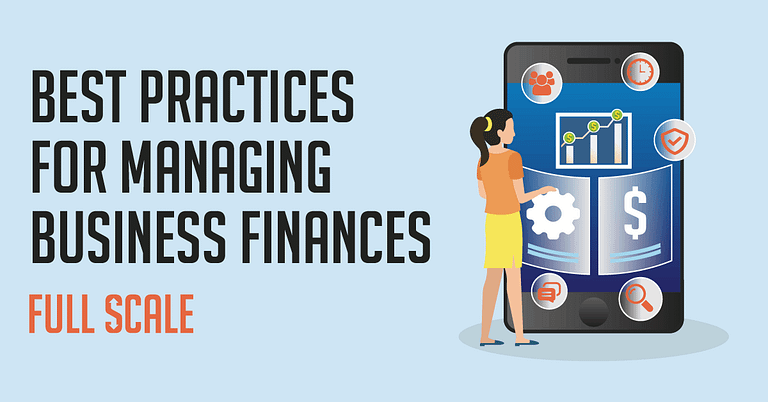Last Updated on 2025-03-09
Updated on December 28, 2023
Effectively managing business finances is crucial for your long-term success. That is why you must know the best practices to boost your company’s fiscal health.
Money—it’s the lifeblood of your organization. One wrong move and things can fall apart quickly. But no need to worry! There are many ways to make informed decisions when it comes to managing business finances.
Vigorous financial practices can help you allocate resources wisely and maintain financial stability. These things can be in the form of budgeting, cash flow management, forecasting, and financial reporting.
Lucky for you, we will explore the best practices for managing business finances for each area in this article. We will also highlight their significance in ensuring financial health. Let’s start!
Managing Business Finances Successfully In Four Practical Ways
Managing business finances effectively opens more opportunities for business development. It helps stabilize your company and increases avenues for further investments. So if you want to take your business to the next level, take note of these financial tips.
1. Budgeting: Setting A Strong Foundation
Budgeting enables you to plan and control your financial activities. It involves creating a comprehensive blueprint for your income and expenses—commonly set annually. Moreover, it helps you identify areas where you can cut costs and save for your goals.
Here are some best practices for effective budgeting patterns.
- Start with historical data. Analyze past financial records to identify trends and patterns. Use it as a baseline for estimating future revenues and expenses.
- Involve your key stakeholders. Collaborate with department heads and key decision-makers to gather input. Doing so ensures that your company’s budget aligns with your strategic goals.
- Set realistic goals. Develop your financial targets based on market conditions, industry benchmarks, and internal capabilities. Keep in mind that overly ambitious budgets may lead to unnecessary pressure and unrealistic expectations.
- Monitor and adjust regularly. Establish a schedule to track and compare actual performance against your budget. Adjustments may be necessary if unforeseen circumstances arise or if there are significant deviations from your plan.
In addition to these tips, you can utilize several budgeting methods for managing business finances. The best way for you will depend on your individual needs and preferences.
- The Envelope System—This manual system involves dividing your cash into different envelopes, labeling each for separate expense categories. When you have expenditures, just take money out of the appropriate envelope.
- The Zero-Based Budget—This method helps you allocate every dollar of your income to a specific expense category. With this plan, you can avoid overspending in one area.
- The Budgeting App—There are many budgeting apps available to help you track your income and expenses. You can stay on track with your budget and adjust as needed in just a few clicks. And if you can’t find what you need, Full Scale can help you create a budgeting app that suits your needs perfectly.
No matter which budgeting method you choose, the most vital thing is creating and sticking to a budget.
2. Cash Flow Management: Maintaining Business Liquidity
Cash flow is the movement of money into and out of your business. Understanding when and how much cash is needed to cover expenses and meet financial obligations is crucial.
Here are our best tricks to save you from stressful financial circumstances when managing business finances.
Forecast cash inflows and outflows
Use historical data, sales projections, and other relevant information to predict future cash flow. Let your data help identify potential gaps and enable proactive measures to maintain liquidity.
Increase cash inflows
Implement effective strategies to speed up the collection of accounts receivable. How? Offer discounts for early payments or present convenient online payment methods.
Manage cash outflows
Negotiate favorable payment terms with suppliers. Take advantage of discounts for early payments or bulk orders. Implement rigorous expense management practices to control unnecessary expenditures.
Create an emergency fund
Set aside a reserve of contingency cash to handle unforeseen events or business downturns. This buffer will provide stability during challenging times. It will also reduce reliance on external financing, such as loans and other financial solutions with interest rates.
Use a credit card with a rewards program
A credit card is a valuable fiscal tool when swiped right. No pun intended. Use your company credit line to earn points or miles that you can redeem for travel or other rewards.
Invest in cash flow management software
Find excellent software to assist you in tracking your outstanding invoices. It gives you some leeway to ensure you get paid and pay your bills on time.
Are you planning to build your own cash flow management software? Full Scale can help you with that. Tell us your specific requirements, and let our software development team create an app for your business.

3. Forecasting: Predicting Future Financial Activities
Forecasting is a method that projects future financial outcomes based on historical data, market trends, and industry analysis. But why is it important to predict your fiscal events? It helps you anticipate potential challenges and opportunities in terms of managing business finances.
If you’re looking for practical tips to create your financial forecast for managing business finances, check these out.
- Employ a combination of techniques, such as trend analysis, regression analysis, and scenario planning, to gain a comprehensive view of future financial performance.
- As new information becomes available, revise and update your financial forecasts accordingly.
- Identify and track relevant KPIs to measure financial performance and validate the accuracy of forecasts. Adjust forecasting models if significant discrepancies arise when managing business finances.
- Consider the impact of external factors on your forecasts, such as economic conditions, industry trends, and regulatory changes.
Business owners need to establish an accurate and relevant forecast. This will help you develop a more precise understanding of your future finances.
4. Financial Reporting: Creating Transparency and Accountability
Financial reporting is all about communicating your business’s financial performance to others. It can be your accountant, investors, creditors, and other stakeholders.
Remember that accurate and timely financial reports are essential for good decision-making, compliance, and trust. The following tips would be helpful in this case.
- Always follow accounting standards—Adhere to relevant accounting standards (e.g., Generally Accepted Accounting Principles) to ensure consistency, comparability, and compliance in financial reporting.
- Strive to maintain accurate records—Implement good bookkeeping and record-keeping practices to capture all financial transactions accurately. This enables you to have a solid foundation for financial reporting when managing business finances.
- Use key financial statements—Prepare and present essential financial statements, such as the balance sheet, income statement, and cash flow statement. They offer a comprehensive view of your financial position and performance.
- Ensure transparency and clarity—Clearly explain the financial information presented in your reports. Include notes on any assumptions or estimates you made. Use plain language to make the reports accessible to a wide range of stakeholders.
There are various financial reports that you may need to prepare. These include:
- An income statement shows your revenue, expenses, and net income.
- The balance sheet defines your assets, liabilities, and equity.
- The cash flow statement reveals your cash inflows and outflows.
These reports enable you to track your progress, identify areas to improve, and help you make decisions for your business.
Effectively Managing Business Finances Can Be Easier
Managing business finances properly is crucial for your long-term success. By implementing these best practices, you can make informed decisions, adapt to changing market conditions, and maintain financial stability. Regularly reviewing and updating these practices will also ensure their continued relevance and effectiveness.
Remember, financial management is an ongoing process. Managing business finances often requires diligence and attention to detail. With our tips, you can enhance your financial performance to position your business for sustainable growth in a competitive landscape.
Invest In Experienced Professionals from Full Scale
Hiring the right people is a good investment for businesses. So if you’re planning to build a software product, enlist the services of Full Scale.
Full Scale has the people, platform, and process to help your business grow. Our fully vetted and highly experienced developers, testers, and leaders are ready to work for you. With our advanced but client-friendly dashboard, you can easily manage your team. And we made sure our processes would support your existing operational structure.
Find out more about our vetting and recruitment process here:
Talk to Us Today!

Matt Watson is a serial tech entrepreneur who has started four companies and had a nine-figure exit. He was the founder and CTO of VinSolutions, the #1 CRM software used in today’s automotive industry. He has over twenty years of experience working as a tech CTO and building cutting-edge SaaS solutions.
As the CEO of Full Scale, he has helped over 100 tech companies build their software services and development teams. Full Scale specializes in helping tech companies grow by augmenting their in-house teams with software development talent from the Philippines.
Matt hosts Startup Hustle, a top podcast about entrepreneurship with over 6 million downloads. He has a wealth of knowledge about startups and business from his personal experience and from interviewing hundreds of other entrepreneurs.





